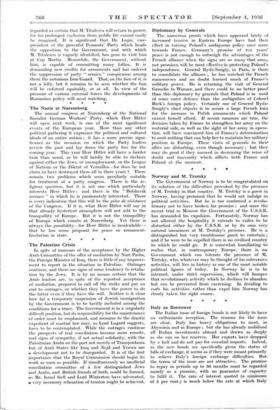The Palestine Crisis In spite of rumours of the acceptance
by the Higher Arab Committee of the offer of mediation by Nun Pasha, the Foreign Minister of Iraq, there is little if any improve- ment to report in the situation in Palestine. Outrages continue, and there are signs of some tendency to retalia- tion by the Jews. It is by no means certain that the Arab leaders are, in spite of the reported acceptance of mediation, prepared to call off the strike and put an end to outrages, or whether they have the power to do the latter even if they have the will. Neither is it clear how far a temporary suspension of Jewish immigration by the Government is to be tacitly included among the conditions for a truce. The Government is in a singularly difficult position, but its responsibility for the maintenance of order must be emphasised, and recourse to the drastic expedient of martial law may, as Lord Lugard suggests, have to be contemplated. While the outrages continue the prospects of real conciliation become more remote, and signs of sympathy, if not actual solidarity, with the Palestinian Arabs on the part not merely of Transjordania but of Arab States like Iraq and Nejd and Yemen are a development not to be disregarded. It is of the first importance that the Royal Commission should begin its work as soon as possible. If simultaneously an unofficial conciliation committee of a few distinguished Jews and Arabs, and British friends of both, could be.formed, te. Mr. Israel Sieff and Lord Winterton have advocated, a very necessary relaxation of tension might be achieved.






































 Previous page
Previous page